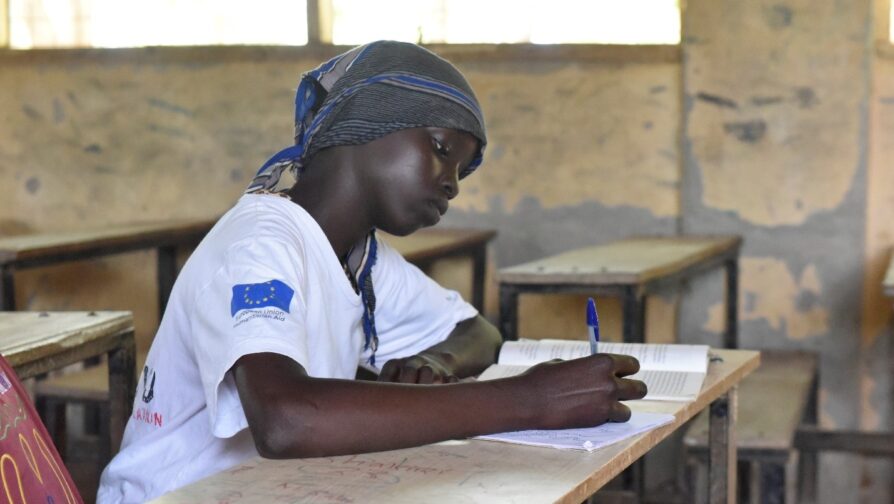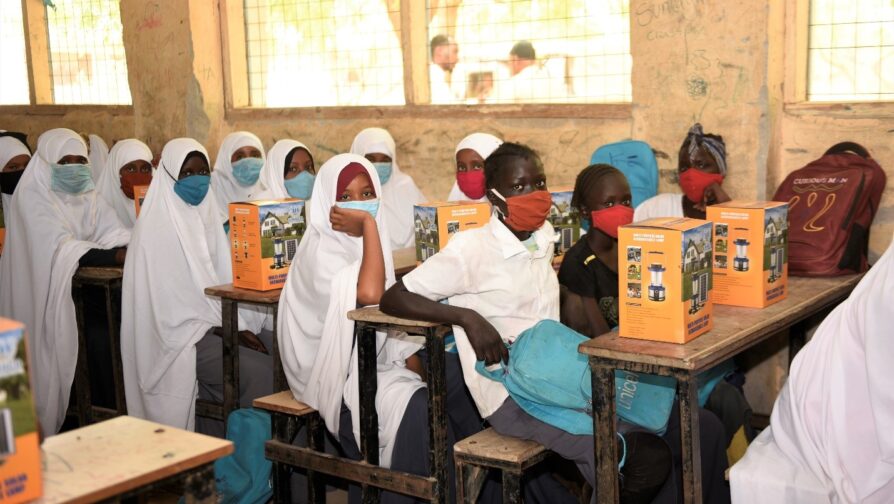
Fardowsa Gedi with books donated by the European Union to support refugee children in the Dadaab refugee camps in Kenya. © UNHCR/Mohamed Maalim
Seated in the middle of her class, 17-year-old Fardowsa Gedi tries to catch up with an on-going lesson of her favourite subject mathematics.
In 2012, Fardowsa’s family fled drought in Somalia and now live in the Ifo camp, which is the oldest of the three refugee camps in the Dadaab Refugee Complex located in Garissa County in north-eastern Kenya.
“I was only nine when we arrived in Kenya. We left our hometown Buale in Somalia because there was no food left for my family,” says Fardowsa. The family came from the southern part of the country where people were starving.
“All the cattle died. Our country only had staple food supplies such as cornmeal or millet. What little was left was sold for high prices. Even the food reserves from food aid programs were running out and armed groups weren’t allowing food aid to be delivered for a long time,” says Gedi, Fardowsa’s father.
Between mid-2011 and mid-2012, drought caused a severe food crisis in Somalia and other countries in the region, which threatened the livelihood of some 9.5 million people. Many people from southern Somalia fled to neighbouring Kenya and Ethiopia.
Despite over 30 years of conflict and displacement, many Somalis have been able to rebuild their lives and thrive in their new homes.
“Learning from her own experiences and challenges and foreseeing the developing role of women, my mother often talked to me about becoming a good person, a good partner, a good mother, but also about the importance of personal growth and accomplishment”, Fardowsa adds.
“My mother told me that if I really want it, I can become a doctor. She also told me that even the biggest dreams can come true.”
“She wants me to help people in our poor, remote community back home as a doctor”, she remarks.
On 15 March 2020, the Kenyan Government closed all schools and colleges nationwide as prevention against the spread of COVID-19. The closure of institutions not only affected learners and teachers, but it also brought numerous economic and social issues, including education exclusion, child protection, increase in teenage pregnancy, and sexual exploitation among other issues.
“The year 2020 was terrible for refugee children in Dadaab, as schools were closed almost the whole year. We anxiously waited for schools to reopen for children to continue with their studies,” says Mr. Aden Hassan, the head teacher of Friends Primary School in Ifo refugee camp.
“We revised our notes as we waited for new instructions from the Ministry of Education. In the beginning, I thought the schools would open again quickly, as I found math difficult to study at home alone. Most topics were difficult to understand without the help of a teacher,” says Fardowsa.

12-year-old Stefanie Steven, a Class 5 pupil in Ifo refugee camp takes notes during a science lesson.
© UNHCR/ Mohamed Maalim
With the support from our donors and partners such as the European Union, UNHCR and education partners in Kenya adopted a remote and digital learning environment including live radio lessons and e-learning for refugees to continue to access education during the COVID-19 pandemic. The European Union is supporting refugee children in both Dadaab and Kakuma refugee camps and Kalobeyei Settlement with learning materials like textbooks and solar-powered lamps for them to study at home.
In 2020, UNHCR, education partners and schoolteachers ensured that students did not miss lessons despite the school closure. “We joined WhatsApp groups where teachers were able to share learning materials and teach us virtually. We also got self-study revision textbooks”, says Fardowsa.

Students receiving solar lamps donated by the European Union to help them study at night. © UNHCR/ Mohamed Maalim
According to Dakane Ahmed Bare, UNHCR’s Education Officer in Dadaab, digital learning platforms such as Google Classrooms, social media platforms and Community Learning Boards became efficient alternative teaching methods during the closure.
“Teachers prepared tailor-made teaching and digital learning materials for the different grades and ages. This was a success considering there were no physical classes during most of the year”, he adds.
Pursuing education remains a challenge for Fardowsa but she is not giving up her hopes and dreams.
“I’m going to focus on biology and chemistry when I start high school. I really want to become a doctor.”
Despite the current circumstances, she is well aware of how important education is and she is determined to do her best to make her dreams come true.
Share on Facebook Share on Twitter